Airport Projects
The Bozeman Yellowstone International Airport is continuously expanding and rehabilitating the terminal and airfield to further serve the needs of southwest Montana's travelers and local aviation community. See below to learn more about BZN's current and completed projects.
Current Projects
Environmental Assessment (EA)
The Bozeman Yellowstone International Airport is conducting an Environmental Assessment to identify and mitigate any potential environmental impacts ahead of proposed airport improvements
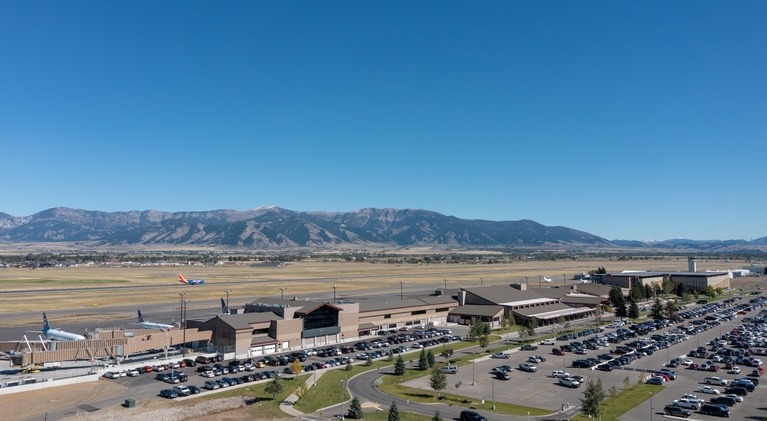
What is an Environmental Assessment and why is it being conducted now?
The purpose of an Environmental Assessment (EA) is to determine whether a proposed action, in this case proposed airport improvements, has the potential to significantly affect the human and natural environment.
Bozeman Yellowstone International Airport is evaluating several proposed improvements, including runway extension and widening, taxi lane and apron construction, water, sanitary sewer, road, drainage and fencing construction, and lighting improvements.
To accommodate these improvements, sections of Airport Road, Lagoon Road, Tubb Road, and East Baseline Road will be removed, with new access being provided by a new proposed roadway connecting Jetway Drive to the Frontage Road (S-205). Some utilities, extensions, and navigational aids will also be relocated, and the turf runway location will be reviewed.
The EA will identify and assess the potential environmental impacts of implementing the proposed improvements and reasonable alternatives.
Why are proposed airport improvements needed?
The recent 2020 Master Plan reflects passenger and aircraft activity at the Bozeman airport is growing. Increased aircraft activity represents a need for additional space, aircraft facilities and redundancy.
The proposed improvements will allow Bozeman Yellowstone Airport to provide capabilities to safely and efficiently accommodate existing and forecasted operations, runway redundancy, provide an area to meet the demand for hangars in a safe and efficient manner, and to meet Federal Aviation Administration (FAA) requirements.
What is the timeline for the EA and proposed improvements?
The EA must be conducted before improvements can begin. The environmental assessment process will take several months to complete. Once the EA is complete, the community will have the opportunity to review the report and provide comments. It is proposed to complete the EA in spring of 2025 with public review, with the potential for the earliest of the proposed improvements to begin construction in summer or fall of 2025.
Project Engagement
August 1 Public Open House
On August 1, 2024, the project team hosted an open house to provide the community with information about the EA process and proposed airport improvements. Exhibits from the open house are below.
How can I get more information?
Updates and opportunities for engagement will be provided throughout the process. To stay up to date, check this page regularly for information and upcoming engagement activities. If you would like to receive email updates, please contact Kristine Fife at kristine@bigskypublicrelations.com.

East Terminal Expansion Project
The Gallatin Airport Authority is pleased to introduce the next chapter of growth and development at the Bozeman Yellowstone International Airport (BZN). Construction is currently underway in preparation for the largest expansion in our airport’s history, the East Terminal Expansion project (ETEP). ETEP is a multi-phase, $140-$180-million-dollar investment designed to enhance passenger and guest experience, increase capacity, and develop crucial infrastructure to support BZN’s current and future growth.
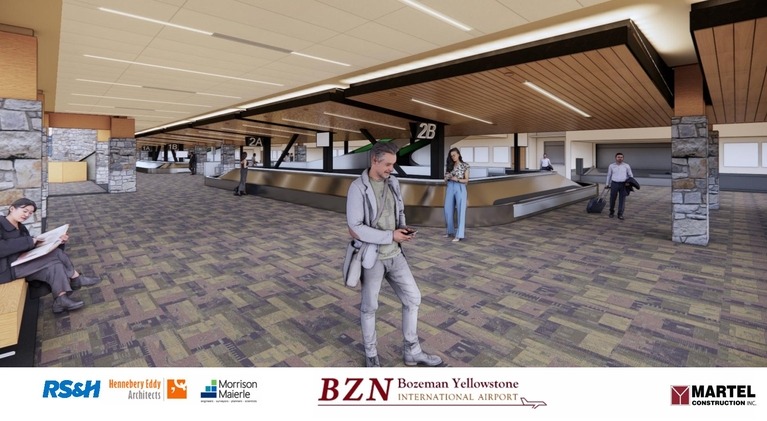
Construction will target the entire east end of the terminal from baggage claim to the parking garage entrance. The projected completion date for this expansion is 2030. Over the next six years, ETEP will unveil:
- An enhanced A Concourse with larger hold-rooms, modern amenities, additional retail, food and beverage concessions and the capability to expand total gates from 12 to 15.
- An expanded baggage claim area equipped with three high-capacity carousels designed to promote a seamless baggage claim process.
- A second security checkpoint on the east end of the terminal.
- A new third floor to support BZN's Airport Administration Offices.
Phases of ETEP will require temporary infrastructure in order to maintain day-to-day airline and passenger operations alongside terminal construction. Passengers traveling this summer can expect to see various construction sites partitioned-off around the east end of the terminal as crews complete Phase 0 (PH0) or “Enabling Phase.” Upon completion of PH0 this fall, Phase 1 (PH1) will begin later this year with demolition of the north half of the original terminal building, excavation, foundation and structural steel.
ETEP is years in the making and will offer travelers an innovative, contemporary, and efficient airport experience while still embracing the historic lodge-like character that defines our airport. This project is a critical investment to ensure BZN continues to meet the needs of our thriving community, passengers, and southwest Montana for years to come.
ETEP Update as of October 15, 2024
Phase 0 (PH0), the "Enabling Phase", of BZN's East Terminal Expansion Project (ETEP) is wrapping up as construction teams unveil temporary infrastructure around the terminal. This vital phase will ensure daily passenger and airline operations carry on alongside construction. Travelers will notice structural changes within the A Concourse and baggage claim as we prepare for Phase 1 (PH1).
On the airside, staff is gearing up to remove a second boarding bridge from service, temporarily reducing our gate count from 12 to 10. Construction teams merged gates A2 and A3 into one joint passenger hold area and positioned two extended fixed tunnels to boarding bridges in order to serve two parked aircraft where there was previously one. As infrastructure becomes available, newly expanded gates will be reinstated.
Enabling baggage claim for expansion was a crucial component of PH0. Construction teams assembled a temporary linear baggage belt and are preparing to remove baggage belt three from service. In order to mitigate passenger constraints and limitations, personnel are prioritizing this area for swift completion. BZN is projecting the first of three high-capacity carousels to be available by winter 2026/2027.
The Gallatin Airport Authority's Administration Offices are the last element of PH0 to be completed. We are pleased to share that all departments will remain onsite but in dispersed locations. Any travelers seeking Airport Authority assistance will need to follow airport signage and wayfinding.
Following the completion of PH0, PH1 is scheduled to begin later this year with demolition of the north half of the original terminal, excavation, foundation, and structural steel. PH1's greatest endeavor will be shoring the building before demolition begins. This ensures the building's integrity is sound for the safety of passengers and employees throughout construction.
Additional information on ETEP will be shared as the project continues. Have a question about the project? Let us know by filling out a submission form below.
ETEP Update as of December 19, 2024
Construction teams have completed Phase 0 (PH0) also known as the "Enabling Phase" of the East Terminal Expansion Project (ETEP). This $7 million-dollar phase focused on stabilizing terminal operations before shifting into Phase 1(PH1). PH1 will include shoring the building in preparation for demolition of the north half of the original terminal building, excavation, foundation, and erecting structural steel. Construction crews expect PH1 to begin shortly after the Holiday season.
Unlike previous terminal expansions at Bozeman Yellowstone International Airport (BZN), ETEP involves demolishing and rebuilding existing infrastructure while maintaining ongoing operations. This is the largest expansion in BZN's history.
Throughout PH0, construction personnel worked to extract equipment and daily operations out of PH1's demolition zone. This transition needed to be done without compromising the airport's efficiency and safety. As a result, the working footprint of the A Concourse and baggage claim has been temporarily reduced. Construction teams repositioned and removed two passenger boarding bridges, merged gates A2 and A3 into one passenger hold area, constructed a temporary linear baggage belt and barrier wall in baggage claim, relocated the Gallatin Airport Authority's (GAA) Administration Office and relocated the Hertz rental car counter.
Many of BZN's iconic architectural features such as the wooden beams and stonework will be preserved and repurposed in the new facility. Additionally, the GAA's Board of Directors approved donating the old restaurant's commercial kitchen equipment to the Belgrade Senior Center. While the need for growth and modernization is essential to meet the demands of increased travel and improved airport facilities it is bittersweet to see pieces of BZN's history give way for the future.
As construction continues on, we ask travelers to please excuse the dust - we're expanding, and our mountain charm remains a must!
ETEP Update as of May 7, 2025
Phase 1 (PH1) of the multi-phase construction effort is well underway, marking the start of a bold new chapter in the airport's transformation.
This phase includes demolition of the airport's oldest terminal spaces and ramp area, along with excavation, foundation preparation, and the installation of structural steel to support the new and expanded terminal design. Shoring of the building is complete and demolition activities were completed as planned.
Travelers and airport personnel may have noticed an increase in noise and activity in and around the terminal as work progresses. We recognize the challenges this presents, and we extend our sincere thanks to our staff, rental car and airline partners, and passengers for their patience and flexibility during this period of temporary infrastructure and ongoing construction.
With demolition complete, the project has moved into foundation work and by fall the assembly of structural steel components will set the stage for future developments that will enhance the travel experience for all.
We are committed to keeping our community informed throughout this process, additional information on PH1 and ETEP will be shared as the project continues.
ETEP Update as of August 12, 2025
A tremendous amount of work has gone into this multi-phase
and multi-million-dollar project over the summer to ensure it stays on track.
Following months of demolition, excavation, foundation work,
and site preparation, construction crews have reached an exciting milestone:
the installation of a main anchor point for a stairwell. This marks the start
of vertical progress, with work starting to rise above the current terminal
footprint. At present, the terminal has only two floors, but crews are
constructing a third-floor that will house the GAA’s administration offices,
complete with improved workspaces, enhanced operational efficiency, training
rooms and a board room.
Meanwhile, the baggage claim area remains an active
construction zone and a primary focus of PH1. Behind the scenes, crews are
making steady progress, and we anticipate work continuing through winter
2026/2027, when the first of three new baggage claim carousels are set to
arrive. Airport staff are working closely with construction teams to coordinate
efforts and minimize passenger impacts as much as possible.
Looking ahead, structural steel will be arriving later this
month. These materials will pave the way for the next major phase of
construction.
We look forward to sharing more updates as the project
continues to take shape and transform. Scroll through the gallery for photos!
Have questions about the project? Let us know by filling out
a submission form below.
ETEP Update as of November 25, 2025
Construction season remained in full swing throughout the fall with consistently favorable weather that kept progress steady. The East Terminal Expansion project (ETEP) continues to stay on schedule thanks to outstanding efforts from the construction crews, whose dedication and expertise have been instrumental in moving the project forward.
To date, 90% of ETEP has gone to bid and a Guaranteed Maximum Price (GMP) for Schedule III has been approved by the Gallatin Airport Authority (GAA). We are proud to share that the project remains under budget, reflecting strong planning, coordination, and execution from everyone involved.
Construction is now highly visible from the landside: three cranes are onsite, meticulously working in tandem as they erect the structural steel that forms the new building's frame with glulam beams rising steadily behind. Sections of concrete have been formed and poured, creating the second and third levels of the expanded facility. This second level will house BZN's second security checkpoint, while the third floor will contain GAA staff offices and a new airport lounge.
Inside the terminal, temporary infrastructure will remain in place in the baggage claim area with the first of the three new baggage carousels scheduled to arrive at BZN in the winter of 2026/2027.
We look forward to sharing more updates as the project continues to take shape and transform. Scroll through the gallery for photos!
Have questions about the project? Let us know by filling out a submission form below.

Completed Projects
Airport Rescue and Fire Fighting (ARFF)/Quick-Response Snow Removal Equipment (SRE) Facility Expansion
An expansion of the Gallatin Airport Authority’s (GAA)
Airport Rescue and Fire Fighting (ARFF)/Quick-Response Snow Removal Equipment
(SRE) facility broke ground during 2024; a vital project designed to ensure the
continued safety, efficiency, and preparedness of the Bozeman Yellowstone
International Airport (BZN). This $7 million-dollar project has three key elements:
the addition of two ARFF apparatus bays, an enhanced operations and maintenance
center, and a snow removal equipment apparatus bay.
BZN’s ARFF facility has evolved over the years and now the
facility is evolving once again to support the airport’s growing fleet of
emergency response and snow removal equipment.
The facility’s ARFF apparatus bays will double from two to
four with an additional 2,350 square feet dedicated to housing the GAA’s three
fire trucks and emergency response equipment. The expansion will also include a
4,290 square foot two-story facility for our Operations and Maintenance teams
complete with office space, a conference room and watch room.
By design, the ARFF facility’s location allows unrestricted
access to the airfield which is paramount in emergency situations and
throughout Montana’s winter. The third element of this expansion involves
constructing an 11,000 square foot apparatus bay outfitted to stage six large
quick-response snow removal equipment pieces. The addition of this SRE building
will strengthen the GAA’s ability to deploy snow teams within closer proximity
to the airfield.
The ARFF expansion comes at a crucial time as BZN continues
to see increased flight operations. This facility is a critical component in
supporting the airport’s operational efficiency, and with the expansion, our
team will be better equipped to ensure the airfield remains safe and ready for
take-off.
This expansion is projected to be completed by late 2025.
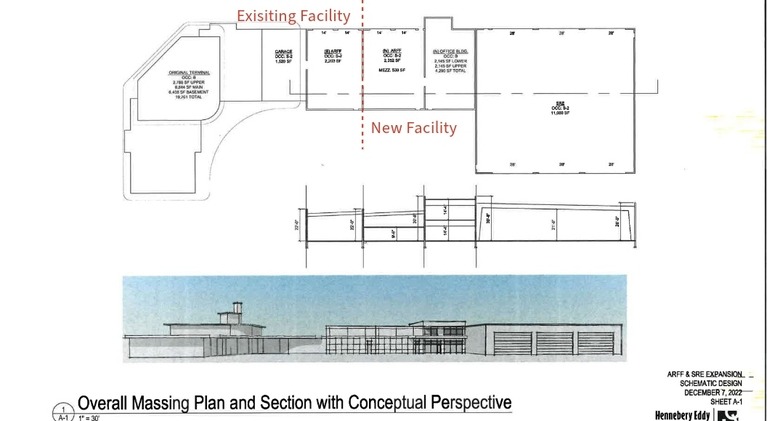
Runway 12/30 Construction and Expansion
Beginning spring of 2025, runway construction is scheduled to take place at the Bozeman Yellowstone International Airport (BZN). This project will require temporary periodic runway closures for the safety of both personnel and aircraft while construction is completed.
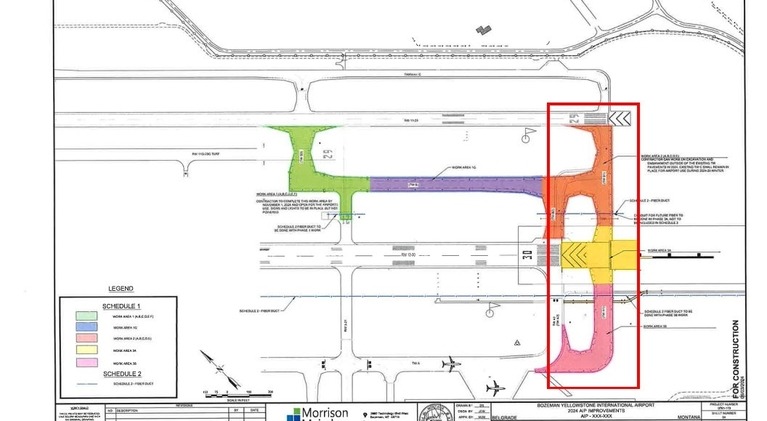
The primary objective of this project is extending BZN's main Runway, 12-30 by 328 feet. This extension will allow for a secondary taxiway off of the main runway. Crews will also utilize this opportunity to install a Medium Intensity Approach Light System with Runway Alignment Indicator Lights (MALSR) on Runway 30. This navigational aid will reduce BZN's landing minimums from a 300-foot ceiling and one (1) mile of visibility to a half (.5) mile, by providing additional guidance to pilots landing in inclement weather conditions.
Temporary periodic runway closures will go into effect April 8 - May 20, 2025, Monday - Friday (weekends excluded) from 3:00 p.m. - 11:00 p.m. To prepare for this project, the Gallatin Airport Authority (GAA) has collaborated extensively with BZN's airline partners and engineers to strategically identify an interval of time suitable for a runway closure. The selected timeframe falls after the winter travel season and before summer travel begins, offering minimal flight disruptions while also taking advantage of moderate temperatures required for successful pavement work and long-term durability.
Our airlines have rescheduled aircraft arrivals and departures to accommodate the runway closure with very few cancellations. Three out of four affected departures were pushed to an earlier departure time and evening arrivals were deferred to an arrival time after 11:00 p.m. Two out of 46 arrivals/departures per day have been cancelled due to the project.
We ask for your patience and understanding as airfield construction plays a vital role in maintaining safe and efficient operations as well as ensures our airport meets the demands of modern aviation.

TSA Checkpoint Queuing Expansion
TSA The Bozeman Yellowstone International Airport (BZN) is pleased to reveal an expanded Transportation Security Administration (TSA) security checkpoint queuing area. This expansion has increased the security checkpoint's footprint by 60% further accommodating the chart-topping passenger growth BZN has experienced.
BZN's security checkpoint, now under the direct operation and management of the TSA, handles an average 3,500 passengers per day. This area expansion paired with the TSA's maximized use of the security screening lanes will comfortably sustain our current and projected passenger numbers.
Relocation, of a portion, of the central Montana Gift Corral storefront and completion of the In-line Baggage Handling System paved the way for this expansion. In order to provide sufficient and expanded retail opportunities across the concourse, a new retail location has been installed in the B Concourse. The new baggage handling area provided an opportunity to shift on-screen resolution baggage operations and information technology equipment out of the security checkpoint. Together, these changes created enough space to expand the checkpoint.
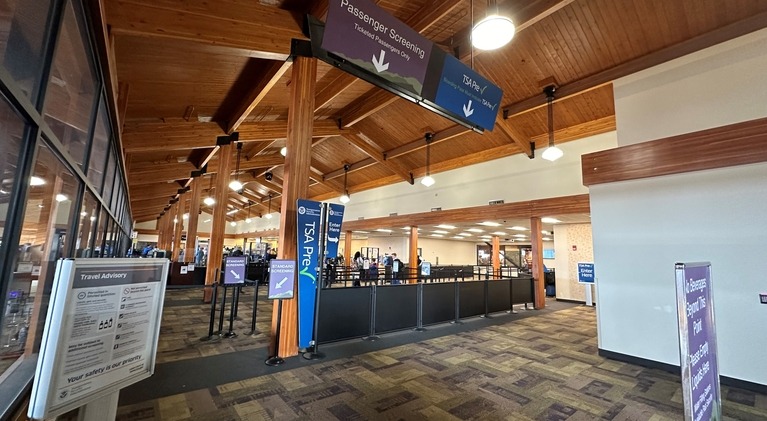
BZN Market
The new BZN Market, located in the B Concourse between gates B2 and B3, was designed to enhance passenger experience. The BZN Market offers convenient self-serve concessions, retail stations, and seating with panoramic views of the Bridger Mountain Range. Grab-and-go or stay awhile, the BZN Market serves any traveler's need.
The market is a blend of BZN's historic lodge-like character and contemporary design. This area offers open concept seating, for roughly 70 people, and is not restricted for dining use. The BZN Market will have pre-packaged warm and fresh to-go food options, a coffee bar, and retail. The BZN Market provides passengers space to work, dine, and socialize outside of gate areas.
The BZN Market's atmosphere will feel similar since it is under direct management and operation of SharBert Enterprises. SharBert currently operates BZN's concessions including, Copper Horse and Ross Peak Grill, the Bistro, and Montana Gift Corral stores. SharBert Enterprises has been serving passengers at BZN for over 20 years and we are pleased to see their presence grow in the terminal.
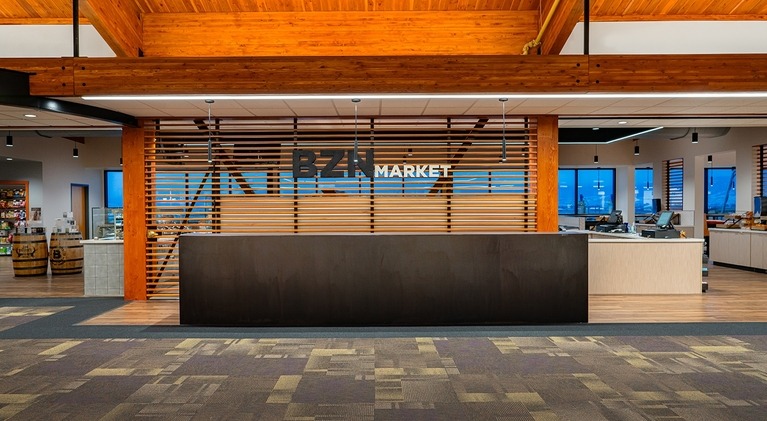
In-Line Baggage Handling System
Behind-the-scenes, BZN has installed a $23-million engineering marvel complete with state-of-the-art Baggage Screening and Explosive Detection technology. This In-line Baggage Handling System upgrade has significantly transformed baggage operations at BZN.
This upgrade is sophisticated and complex awarding it the most electronically advanced system upgrade in BZN history. We are operating a system comparable to Denver International Airport and Salt Lake City Airport but on a much smaller scale. Daily functions and operation of the baggage system are overseen by a specialized maintenance team under the Gallatin Airport Authority.
BZN's baggage handling area is now made up of over 3,300 linear feet of interconnected conveyor belts that systematically control baggage from the ticket counters through TSA screening and delivers them to each individual airline for loading onto baggage carts. On average, BZN handles roughly four thousand bags per day with peak travel periods seeing up to ten thousand departing bags. This system is designed to transport oversized items such as skis and golf clubs in the same process as regular baggage. This capability simplifies the process for both passengers and BZN's airline partners.
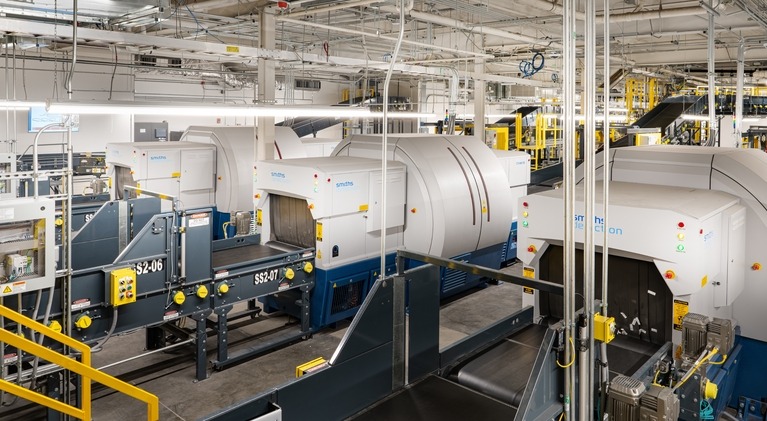
Contact Us
If you have questions or concerns about a current project, you can contact the airport directly using the form below.
* Required
